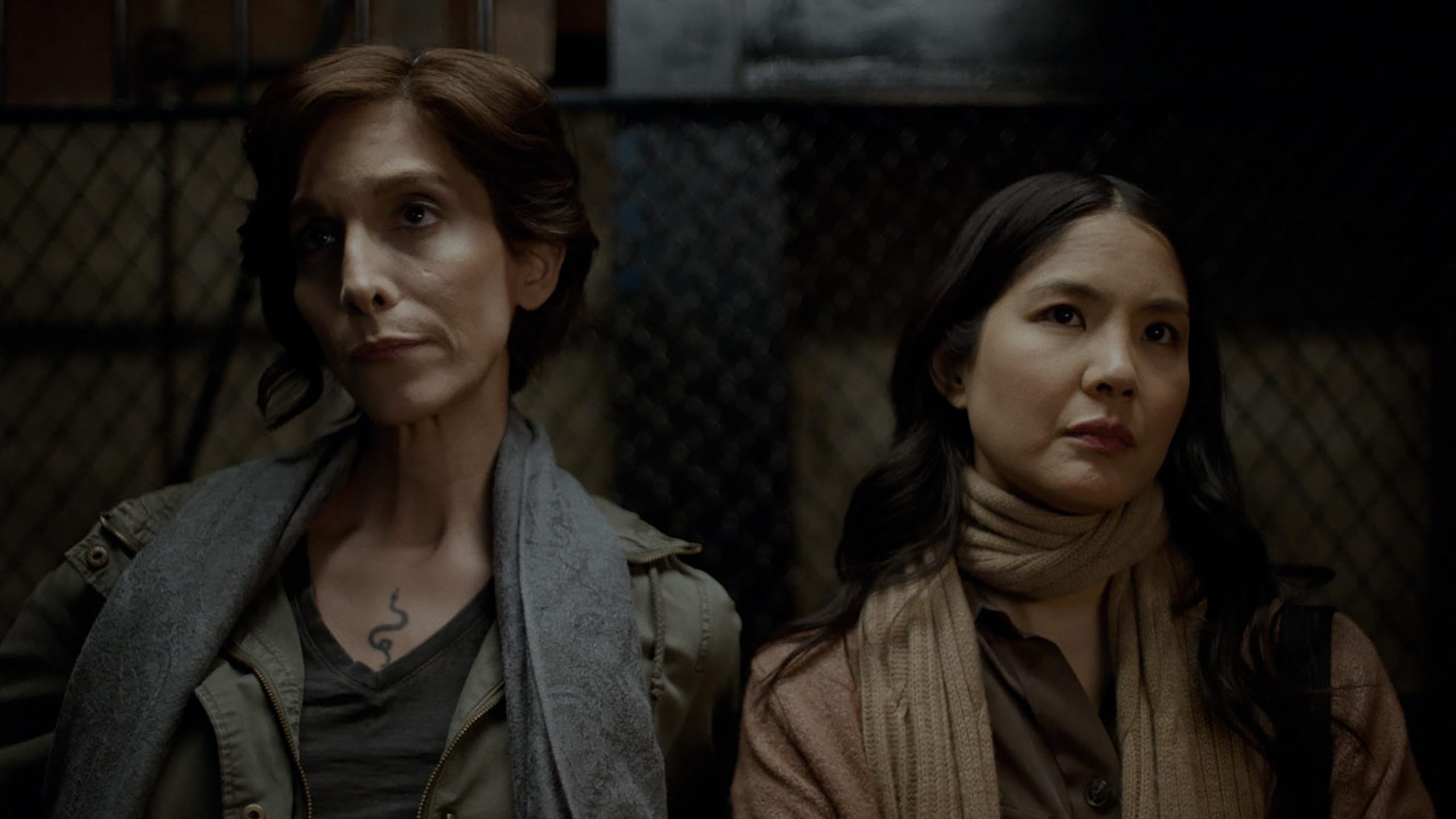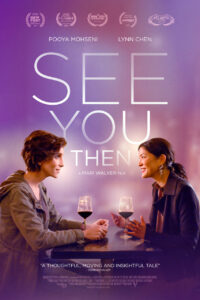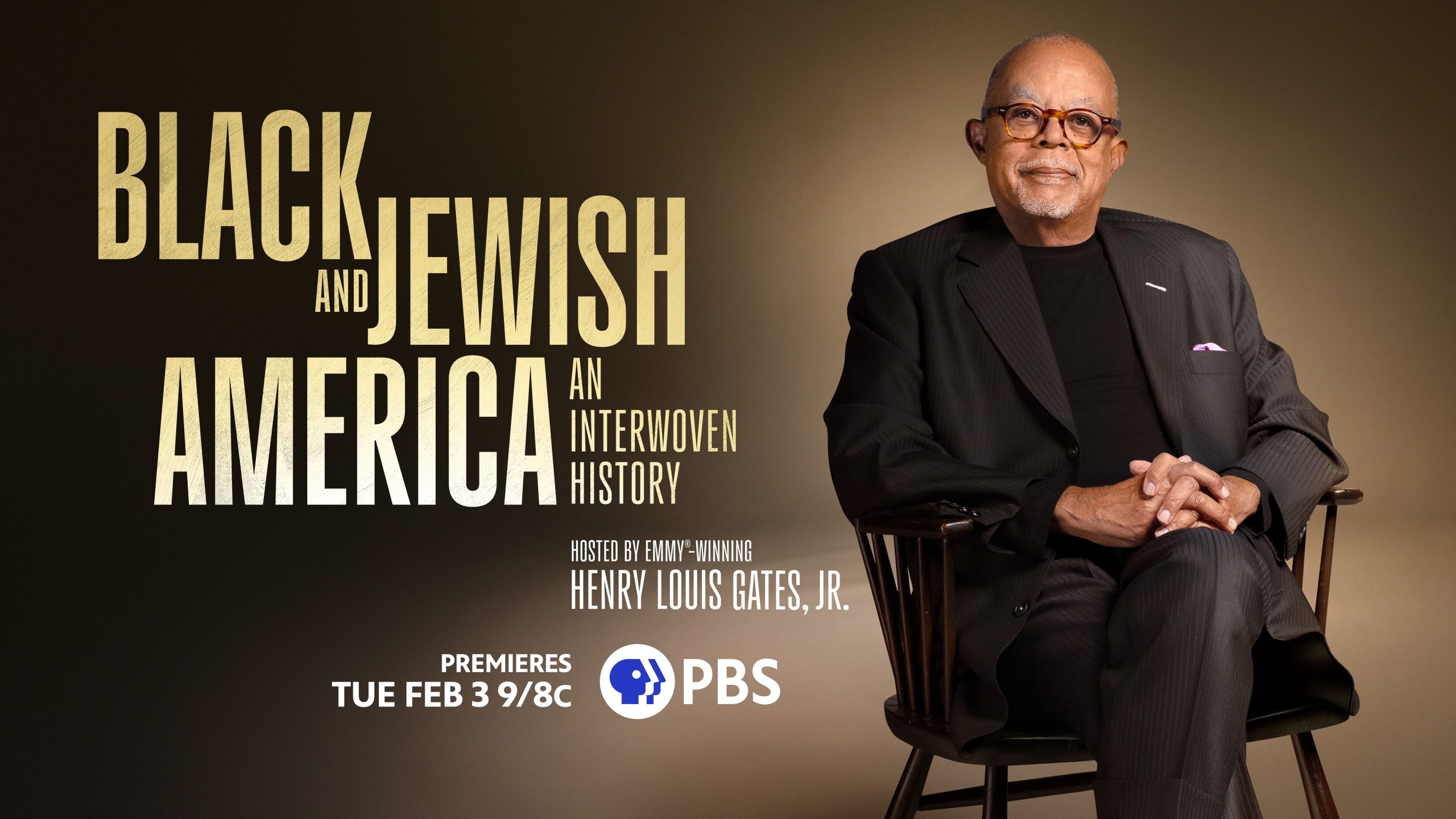
Mari Walker, Lynn Chen, and Pooya Mohseni sat down with Solzy at the Movies during SXSW 2021 to discuss their new film, See You Then.
Following a theatrical release from Breaking Glass Pictures in early April, See You Then is now available to watch at home on VOD.

I know it’s not the premiere you wanted but how thrilled are you to premiere the film during the 2021 virtual SXSW film festival?
Mari Walker: Oh, so thrilled. I’m so excited. It’s always been a dream of mine to have a film that I directed premiere at SXSW. Even in its online form, it’s still just—I feel all the warm fuzzies. It’s all wonderful. I also think it’s really great, too, because I think more audiences than ever will be able to see the movie because it’s going to be online versus going directly to Austin so I’m very excited.
And then having to deal with the logistics of getting lodging and trying to catch and Uber or Lyft. That could be a nightmare!
Mari Walker: Oh, I know, right? Yeah, yeah, I agree. I stayed about 45 minutes outside of SXSW last time. That’s a little insane driving in every day and then driving back every day. It’s nice to be able to do it all through the confines of computer.
It’s not often that we get a narrative feature film featuring both a transgender director and lead. Taking this into account, is it more exciting to get into SXSW?
Mari Walker: Yeah, I think so. I think it’s extremely exciting. I think that we need more representation now more than ever especially with things like Pose ending in its third season. We just need more trans material out there. It’s really great to have the support of something like South by Southwest to be able to promote and premiere the movie.
What was the genesis behind the screenplay for See You Then?
Mari Walker: I had always dreamed of directing a feature ever since I was in high school. Most of the scripts I had written were vast and huge, and the budgets were totally out of control. I felt like it was necessary for me to spend actual time working on a very odd chamber piece, a very small, intimate story. I felt the need to learn how to direct actors better because I felt like I hadn’t had as much of that experience through the doc world. I started writing it as a form of art therapy because there’s so many parallels to the characters to what they were thinking on both sides of Kris and Naomi, certainly for myself and for my co writer as well. We just fell in love with them and felt really bad about ruining their lives but had to do it for dramatic sake. We went and made it with these two amazing performers here, Lynn and Pooya, who are just absolute acting geniuses. I don’t even know how else to describe it. I was blown away every single day. Really and truly, it was awesome.

For Pooya and Lynn, what was it about the script that attracted you to the roles?
Pooya Mohseni: As a trans person, you would understand this probably better than most. The representation of trans characters I feel for the most part has been lacking in authenticity, in breadth of experience, not creating some monolith, with some exceptions, maybe Pose as Mari was saying, What I liked about it, this was a full character. She wasn’t somebody’s victim. She wasn’t going to be rescued by someone or vilified by somebody else. The character herself was outside the norm of how a trans character usually gets representation. She was a tech-savvy professional, who looked a certain way, who sounded a certain way, who was—I go back to this, a full person, with experiences, with shortcomings, with desires, with regrets, with fears.
To be able to do that, a full character that is multifaceted and is a human being and know that the people who wrote these characters—Mari and Kristen—wrote them with love, not with fetish, not with a sense of wanting to tokenize this character, and then Mari directing it. Again, bringing that love, that care, that attention, and to play opposite my friend, Lynn, it was very different than experiences I’ve had before that. In that sense, I hope that every time I represent a trans character from now on, it will have this much love put into it, this much care about how this character is represented, and how full this character is.
I hope that this is going to be the first of a new generation of trans writers, trans directors, trans producers, and trans actors being able to get their hands on and their teeth into some juicy or more powerful storylines than they’ve had the chance to do up to this point.
Lynn Chen: Yes, for all the reasons Pooya was saying about having a character that was trans, who is fully formed and human and knowing that it came from such a personal place by Mari. I just wanted to help serve and tell that story. My character, Naomi, was very full and rich in her own way, very flawed. I’ve always been attracted to stories that take place over the course of one evening with lots of talking like the Before Sunrise series. When I saw that, plus the option to be able to be an ally again for the LGBTQ community, which I hadn’t done in 15 years, with Saving Face, I just knew I want to be a part of this. I want to help tell this story. That was a huge part of why I said I’m going for this when I had the opportunity.
You’re at SXSW for the third straight year in a row now.
Lynn Chen: Third year, yes.
How different is it with—last year, the fest just outright got canceled.
Lynn Chen: I am so happy that is virtual this year, that there’s something because I know I would have wanted that for my own movie last year. It was crazy in 2019 when I was there with Go Back to China so I knew how much work it would be. This is kind of a nice medium—get to have it at home. But yeah, that whole rushing around from place to place and getting lost and oh, my shoe’s starting to fall apart by day two. Yeah, we don’t have to deal with that. It’s different.
What was the most challenging part of the production?
Mari Walker: I think the late nights. Kristen and I made the somewhat ridiculous decision to set the entire movie at night. Even one of our producers was like, you know that’s kind of the insane, right? I was like, Yeah, yeah, whatever, whatever, we’ll be able to figure out. It’s all fine. It’s all good. Everybody’s gonna have a great time.
I have to admit, certainly before shooting, I was very much a night owl. I think it was the second week and I was like, if I’m feeling this tired, then I can’t even imagine what normal people who get regular sleeping hours must be feeling like. I think that was probably one of our biggest challenges and just the bitter cold. We shot in January in LA and I swear it was the coldest Los Angeles has ever been. We unfortunately also had these two amazing performers walk out in the middle of the night, outdoors for a number of scenes.
I have to give both of you a tremendous amount of credit because I don’t know how you’re able to embody other humans while suffering through that cold, because I could barely think just by myself as a person. I really appreciate the whole everybody who worked on the film, who was willing to put up with those hours and our crew was just so accommodating and understanding of that. It was really a director’s dream to have such an amazing group of people who were so understanding and cared about the story and wanted the story to succeed. Just so grateful.
What were the challenges of doing post-production during a pandemic?
Mari Walker: It was wonderful and it was terrible. It was terrible because we only got to do one in-person screening and only one of my producers was in Los Angeles at the time. We sat down and I subjected her to an extremely long assembly of it. And then we’re like, Okay, cool. Two weeks from now, you’ll have a new cut and then we’ll be able to sit down and go over it. I’m like, Oh, great. Great. Yes, absolutely. And then, of course, two weeks later, we were all locked down. Not being able to screen the film, with an audience, particularly for this kind of film was really, really hard because one of the great benefits of working with someplace like Vanishing Angle, our production company, was we would usually have, at least once a month, a screening of a project in progress. We get all these different groups of people to come in and give their notes on the scripts. There’s nothing that can help a director more than sitting in a room and watching people react to your film. Not having that was really, really challenging.
But at the same time, it was the most painterly editing has ever been because I was basically entirely by myself in my apartment with nobody else there, just sitting for hours working on the film. With that schedule, I was also able to take days off and come back and reflect on the material, make sure that I felt comfortable with the way that the pace of the scene was going. In some ways, it was almost the most ideal editing experience I’ve ever had in my life. It was beautiful and I don’t think—well, knock on wood—I certainly never want anything like this to happen again in our world. But I don’t think it’ll ever be quite that same way again, in terms of just the artistic fulfillment that it gave me. Very thankful for that. It’s exciting to be able to screen it for audiences and start to hear what people think outside of our good circle friends, who are very critical and thankfully gave me some really important notes.
How collaborative were the team at Vanishing Angle?
Mari Walker: Oh, they’re so collaborative. Vanishing Angle is a production company but it’s also a collection of people who all want to support each other. When we were on sets, Jim Cummings stopped by. Danny Madden stopped by. Matt and Natalie were on a different shoot at the time but it was really great to just have that support come in and just give me a little boost every couple days. Knowing that those filmmakers who’ve come before me are supportive and encouraging, I think was just a huge resource and really gave me that courage to make the movie.
Do you feel that transgender representation on screen has improved over the past few years?
Mari Walker: I think that it’s improving. I’m concerned, obviously. Hopefully, it’s coming from a creative decision but it was disappointing to see things like Pose end in its third season. I think that we’re moving into an environment where as trans filmmakers, we’re going to have to push even harder to get our material out there, I think, in the coming years. I think now is more important than ever. What I have seen, hopefully, with our film but also with other films that I’ve seen, from filmmakers at SXSW and others, that there is a shift in the types of narratives that are being told about the queer community, and particularly about the trans community. I think that’s super exciting. I think that that’s something that people don’t spend a lot of time thinking about is that we’ve only been making movies for a little over 100 years. There’s a whole wealth of stories that haven’t been told yet. There’s a whole wealth of stories that still—that representation, and that understanding of character and person still needs to exist. I think, particularly with pandemic, I worry about voices being lost. I worry about films being lost and filmmakers losing their opportunities. I think when we come out of the pandemic, we just have to push harder than ever to make sure our voices are being heard.
Do you think that a documentary like Disclosure could be a game-changer in terms of opportunities?
Mari Walker: I think Disclosure is an amazing documentary. I love Sam and I thought Sam did an incredible job with it. I think it’s good to make people aware of the types of representation that we’ve been seeing even in this last decade. Yeah, I think getting that message out there is really important. I hope that it’ll inspire younger filmmakers in the queer community to step out and make stories. I’m very excited to see what Gen Zers bring to the table because they’ve been using media ever since they were kids. I got in late in the game in terms of like middle school, high school is like, Oh, I’ll learn how to edit. These kids have been making movies since elementary school. I think they’re gonna have some really interesting authentic voices in the coming future.
What do you want people to take away from See You Then?
Pooya Mohseni: To see a trans character as a human being, that has the same needs, the same downfalls, blindspots, regrets, desires as anybody else. As a trans advocate, aside from being a trans actor, for me, I would like queer people of whatever age they are, wherever they are on their journey, if they feel lost or alone or somehow less deserving of all the things that everybody else has, I would like them to see this and feel that they’re not completely alone—that somebody sees them. Somebody appreciates their stories. Somebody wants to tell their stories. If that makes their journey be a little fuller, a little less difficult, and makes them know that there’s a future for them—if that’s what they get from this movie then I, and I’m sure Mari would and Lynn, we would all be very happy if that’s what they take away from this movie.
Lynn Chen: I would love for any trans people who see this movie to feel validated, especially trans people of color. I would love for those who are not trans to think about what it means to be an ally. I would love for women—by women, I mean, anybody who identifies as a woman—to think about what it means to be a woman, what it means to be a woman today, what it means to be a woman in society, what it means to be a woman in your relationships. I think this movie really opens up these questions and can allow for a lot of dialogue and a lot of self reflection.
Mari Walker: I agree with both sentiments. I also think that certainly our hope and part of the design of the film, I think, is to promote a certain sense of universality. That even though these are experiences that are happening to an Asian-American woman or an Iranian-American trans woman, that that they still are stories of loss and regret, and the lives and lived that we always think we spend our time thinking about. I think that that could be something that anybody hopefully of any gender, creed, anything across the world could understand. With any hope, we can expand those people’s minds a little bit and see that we’re all not that different. We’re just people and we want to live we want to have wonderful, fulfilling lives and meaningful lives. That’s what I’d hope people could come away with.
See You Then is now available on VOD.
Please subscribe to Solzy at the Movies on Substack.





